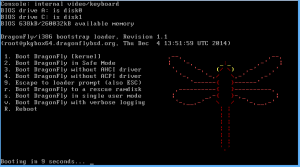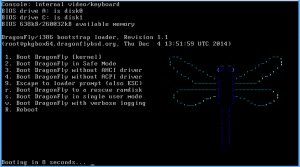One way to keep file history on an very active Hammer disk from eating up all the space: more snapshots. This may seem counterproductive, but disk pruning eliminates historical data between snapshots, so you can keep older data at the cost of some temporal accuracy.
As part of another thread, Steve Petrie posted an in-depth description of how and where and why he’s using DragonFly. Worth looking at either for workflow tips or for just seeing the use case.
I sort of lost a day this week because of an accidental 20-hour workday, but I still have the links:
- I love cross-pollination. (plus)
- “Why I (mostly) hack on BSD licenced stuff: so I don’t have to deal with this.“
- Tips on pkgsrc packaging.
- Kerberos IV is going away in pkgsrc.
- The pkgsrc-2014Q4 freeze is on.
- A new way to build NanoBSD.
- A new ZFS ARC tunable you may need.
- I could have sworn vigr(8) already existed.
- PC-BSD is moving to Qt5.
- A domain blocking script.
- Showing remote programs on your Mac using X.
- Long thread about BSD VPS hosting. (consensus: try RootBSD or Vultr.)
- OpenBSD man is now really mandoc.
- freebsd-update issues for 10.1.
- Steam on PC-BSD 2. (video)
- The (new) PC-BSD upgrade to 10.1 is available.
- Sunday Morning Linux Review on “FreeBSD Mastery: Storage Essentials”
- Sudo: You’re Doing It Wrong.
- “…what’s the best place to start learning about BSD?“
Note: corrected VPS hosting link.
From a question about mixing in a SSD and a very slow disk: swapcache can make things better, though I suggest other crazy arrangements.
If you really, really want to make sure you aren’t pulling in any parts of X when installing dports, and you’re building from source, there’s a few options you can set to keep X11 off your system. You can even go farther.
I had to type it that way because it rhymes. Sascha Wildner has committed an IPMI driver port, tested/watchdogged by Markus Pfeiffer. What’s it do? It’s a machine management standard.
Get ready for some reading.
- There’s some packages moving from pkgsrc-wip to pkgsrc proper.
- pkgsrc-2014Q4 branching is planned for Monday the 15th.
- PC-BSD now has an automatic package/security patch upgrade mechanism.
- Steam on PC-BSD. Holy grail, there.
- PC-BSD needs testers for the new Update Manager, for moving from 10 to 10.1
- NetBSD has imported BIND 9.10.1-P1.
- OpenBSD has added skgpio(4), a driver for the Soekris net6501 GPIO port and LEDs.
- OpenBSD has updated Unbound to 1.5.1.
- Some Japanese input methods for OpenBSD that may work on other BSDs, too.
- pfqstat, a replacements for pfstat designed to work with Charted.
- I don’t know what the ‘BERI Virtio Networking Frontend’ is, but FreeBSD’s got it.
- fstyp(8), the filesystem detector.
- FreeBSD has added AES-ICM and AES-GCM modes to OpenCrypto.
- If you’re stopping in NYC, NYCBUG would like to hear you talk on a topic of interest.
- The case for distributed operating systems in the data center. Sounds like DragonFly’s original charter. (via)
- BSDNow wants to hear your getting-into-BSD story.
- OpenBSD libc version 78.
- There’s a lot of FreeBSD systems at NYI.
- “FreeBSD Mastery: Storage Essentials” is now in physical print.
- “Networking for System Administrators” is next to come out.
- And “Tarsnap Mastery” is next to be written.
- …We’re all benefiting from Michael Lucas going full-time on writing.
It’s possible, if you are several releases (years) behind, to end up with a DragonFly system that can’t compile and install the current release, due to incremental changes over time. It’s rare, but it could happen now between, say, version 3.4 and 4.0. The usual solution would be to incrementally upgrade in order, which is a lot of building and updating. The alternative is the new installworld-force option from Matthew Dillon that forces a new set of binaries into place. Use as a last resort.
If you want to help I/O performance when DragonFly is virtualized, here’s a short checklist of what to work on. I haven’t noticed any problems – but I’m not taxing any of my VMs that heavily.
bycn82’s rewrite of IPFW2 is available as a git branch to try out; he’s posted the link. Please try, especially if you are still working with the original ipfw.
(note: remember, ‘ipfw’ in DragonFly is what was called ‘ipfw2’ years and years ago because it was a replacement of the original ‘ipfw’ in FreeBSD. It was called ipfw2 but referenced as ipfw so that the same commands worked. Technically, this branch bycn82 is working on would be ipfw3, but he keeps referring to it as ipfw2. Confused? Good.)
If you’re using one of those Acer C720 or C720p Chromebooks with DragonFly, remember to set:
machdep.mwait.CX.idle=AUTODEEP
To automatically enter the right power-saving states on the CPU. You used to have to do it manually, and now you don’t.
Sascha Wilder ported over the urio(4) driver to DragonFly. It’s for the USB-based Rio mp3 players. Does anyone have one of these and is running DragonFly? That would be a startling coincidence.
I have been building up quite the variety this week.
- Bitrig 1.0 has been released.
- Writing NetBSD Sound Drivers in Haskell. (PDF, via)
- ruBSD 2014, happening December 13th in Moscow. (via)
- How to configure full disk encryption in PC-BSD 10.1. (via)
- BSD Magazine for November 2014. (via) Why don’t they put new issue announcements in their RSS?
- A week of pkgsrc #5.
- FreeBSD Foundation’s 2014 year-end fundraising.
- FreeBSD Mastery: Storage Essentials is hitting the printers. There’s a quiet mention of the next two books in that series, too.
- Two new kernel errata for OpenBSD.
- BSDCan 2015 (June 2015) has opened up its call for papers, now through Jan 19th, 2015. (via)
- A conversation about UTF-8, Unicode, and file systems.
- A conversation about random vs. phrase passwords.
- New Directions in Operating Systems conference notes. Lots of BSD stuff in there. (via)
- nih-0.13.0 is out for pkgsrc.
- BSD presentations (including DragonFly) at the X Developers Conference. I mentioned the event itself before, but that link wasn’t open to non-subscribers until later, as pointed out to me.
- Coreboot on the BSDs.
- More talk about embedded OpenBSD on cheap machines, including thin client machines repurposed into routers.
- Noticed in that previous link: <$100 Ubuquiti EdgeRouter-Lites can run OpenBSD? FreeBSD too, apparently.
- Is it time to give BSDs a try?
- Fixing PC-BSD upgrade issues.
This page, Varialus et Anisoptera, set up by… I’m not sure of the real name but it’s ‘varialus’ on IRC – has a detailed description of the DragonFly install process and installation of MATE, plus extra notes. I always find these sorts of cheatsheets entertaining.
The DragonFly boot menu has been cleaned up a bit, and Fred, the dragonfly drawn on DragonFly, is now in better color. In fact, there’s even an option to turn him blue.
Update: I wanted to see what this looked like, and I realized screenshots might help everyone else.


In an effort to reduce my backlog of DragonFly things to post about, here’s quick notes:
- The path to xauth is now configurable, though correct by default. (that’s bit me in the past)
- There’s a new callout*() implementation.
- cpuctl(4) has been imported to allow CPU microcode updates.
- libm has been updated with math functions from FreeBSD and NetBSD, which because of library versioning support, won’t cause compatibility problems for older vs. newer DragonFly versions.
- C++11 support is also now available.
I’m running behind so this is a bit old, but: Matthew Dillon commited svc(8), a service manager program. Take a look at its man page to see the potential uses.
Robin Hahling wants feedback on where to go in DragonFly with rcrun(8), service(8), and similar commands. Follow the thread to see the various opinions.
Predrag Punosevac posted his writeup of using LDAP and DragonFly, which I’m noting here for the next person that needs LDAP authentication.
With a recent commit from Sascha Wildner, DragonFly now loads XHCI (meaning USB3) by default. If you had previously tried to install DragonFly via USB stick, and it inexplicably refused to mou t the installer drive… It may work much better now.
